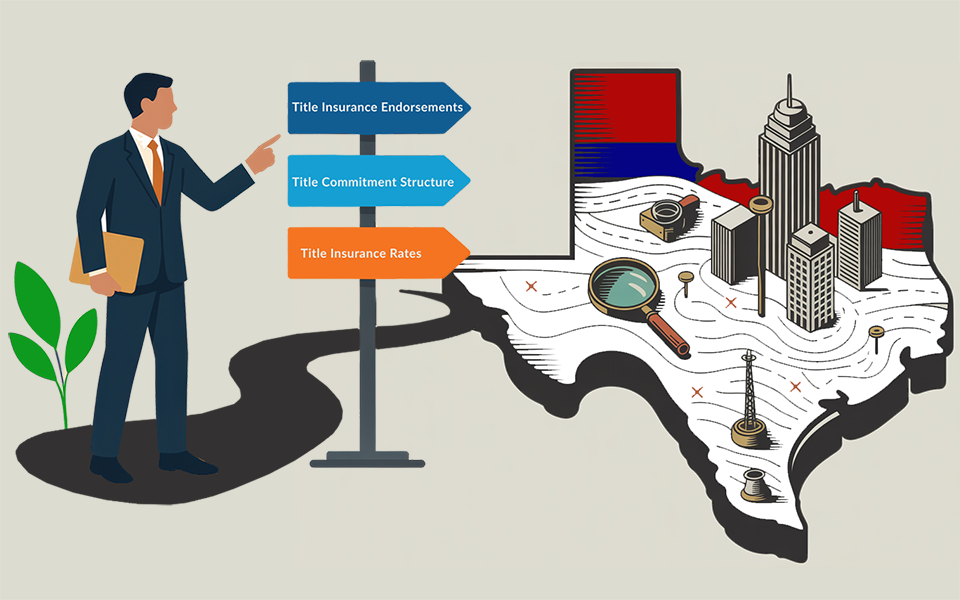FinCEN Compliance Reporting Services — Be Ready Before March 1, 2026 Learn More →
December 22, 2025
🎙️QuickCast: Future Trends in the Title Industry.

Future Trends in the Title Industry. Technologies Shaping Real Estate Transactions.
The title industry, like many others, is undergoing significant transformation due to technological advancements. While some of these changes are already reshaping the way transactions are conducted, others are still emerging but promise to redefine the industry in the near future. In this podcast, we’ll explore the key trends and technologies impacting the title insurance industry and what professionals in the field should anticipate as the future unfolds.
1. Digital Closings: Efficiency and Convenience in Real Estate Transactions
One of the most prominent trends in the title industry is the increasing adoption of digital closings. Traditionally, real estate closings required physical paperwork, in-person signings, and a lengthy process involving numerous stakeholders. Today, eClosings allow transactions to be conducted electronically, significantly speeding up the process and reducing the reliance on in-person interactions.
Key components of digital closings include:
- eSignatures: Electronic signatures are legally recognized in many countries and states, making it easier for parties to sign documents without being physically present.
- Remote Online Notarization (RON): This technology enables notaries to notarize documents remotely using audio-visual communication, streamlining one of the most time-consuming steps in the closing process.
- eRecording: With eRecording, title documents can be recorded digitally with the county, reducing the need for physical delivery and further speeding up the process.
Digital closings are particularly beneficial in reducing errors associated with manual paperwork and improving overall efficiency. As remote transactions become more common, the role of digital closings will continue to grow, offering a more seamless experience for everyone involved in the real estate process.
2. Blockchain: The Future of Title Transparency and Security
Blockchain technology, while often associated with cryptocurrencies, holds immense potential for the title industry. Blockchain is essentially a secure, decentralized digital ledger that records transactions across multiple computers, making it nearly impossible to alter or tamper with records.
Here’s how blockchain can transform the title industry:
- Immutable Records: Once information is recorded on the blockchain, it cannot be changed. This provides a higher level of security and trust in the accuracy of property ownership records.
- Faster and More Reliable Title Searches: Blockchain could eliminate the need for extensive manual title searches by providing a single, unchangeable source of truth for property records. This would save time, reduce errors, and simplify the title search process.
- Reduced Fraud: By making property records tamper-proof, blockchain can help prevent fraud, such as forged deeds or fraudulent property transfers. With every transaction recorded and verified on the blockchain, it becomes extremely difficult for bad actors to manipulate ownership records.
While blockchain is still in the early stages of adoption in the title industry, its potential to improve transparency, efficiency, and security is undeniable. As more companies and municipalities explore the use of blockchain for property records, its impact on the industry is expected to grow.
3. Artificial Intelligence (AI): Revolutionizing Title Searches and Fraud Detection
Artificial intelligence (AI) is another emerging technology that is beginning to make a significant impact in the title industry. AI has the ability to process vast amounts of data quickly, making it an invaluable tool for title searches and fraud detection.
Key applications of AI in the title industry include:
- Automated Title Searches: Traditionally, title searches involve manually reviewing property records, deeds, liens, and other documents. AI can streamline this process by rapidly analyzing large datasets and identifying any potential issues with a property’s title. This can save significant time and resources, allowing title professionals to focus on more complex tasks.
- Document Analysis: AI-powered tools can assist in reviewing and analyzing legal documents, such as title commitments and policies. These tools can flag discrepancies or missing information, helping to reduce errors and ensure that the documents are accurate and complete.
- Fraud Detection: AI can also be used to detect patterns and anomalies in data that may indicate fraud. By analyzing transactional data, AI systems can identify suspicious activities, such as unusual property transfers or inconsistent ownership records, helping to prevent fraudulent transactions before they occur.
The use of AI is expected to continue to grow, as it offers significant potential to improve the accuracy and efficiency of title searches while reducing the risk of human error.
4. Cybersecurity: Protecting Sensitive Information in an Increasingly Digital World
As the title industry becomes more reliant on digital processes, cybersecurity has become a critical concern. Title companies handle a vast amount of sensitive information, including personal data and financial details, making them prime targets for cybercriminals.
One of the most pressing threats in the industry is wire fraud. Cybercriminals often target real estate transactions by intercepting communications between parties and diverting funds to fraudulent accounts. This type of fraud can be devastating, resulting in significant financial losses for both buyers and sellers.
Here are some key cybersecurity practices that are becoming standard in the industry:
- Encryption: Encrypting sensitive data ensures that it cannot be accessed by unauthorized parties, even if it is intercepted during transmission.
- Secure Communication Channels: Title professionals are increasingly using secure email platforms and encrypted messaging services to protect against cyber threats.
- Multi-Factor Authentication (MFA): Implementing MFA adds an extra layer of security by requiring users to verify their identity using multiple methods, such as a password and a fingerprint or code sent to their phone.
As digital transactions become more common, robust cybersecurity practices will be essential to protecting the integrity of the title industry and safeguarding the sensitive information that is handled during real estate transactions.
5. The Future Outlook: What’s Next for the Title Industry?
Looking ahead, the title industry will continue to be shaped by these technological advancements. Digital closings, blockchain, AI, and cybersecurity will all play critical roles in the future of real estate transactions, making the process faster, more efficient, and more secure.
- Increased Adoption of Digital Tools: As more companies and consumers embrace digital tools, we can expect the process of closing real estate transactions to become even more streamlined.
- Wider Use of Blockchain: Municipalities and governments are likely to explore the use of blockchain for maintaining public records, making it a central part of title searches in the future.
- AI-Driven Automation: AI will likely become even more integrated into the title search process, automating many of the repetitive tasks that currently require manual effort.
- Stronger Cybersecurity Measures: As cyber threats continue to evolve, the industry will need to stay ahead by implementing the latest cybersecurity protocols to protect sensitive information.
The title industry is on the brink of a significant transformation, and professionals who stay informed about these trends will be better prepared to adapt and thrive in this evolving landscape.
Related Posts
Title Acceptance Pilot Explained for Title & Settlement Teams
A practical guide to the Title Acceptance pilot, covering eligibility, workflow changes, risk controls, and what title teams must document and protect.
February 27, 2026
The Hidden Costs of FinCEN Non-Compliance: Why Waiting Until March Could Cost Your Title Company Thousands
It's March 15, 2026. Your closer just wrapped a cash-to-LLC transaction. A straightforward deal, nothing unusual. Then someone on the team asks ...
February 27, 2026
How to Read a Title Commitment: 12 Exceptions That Scare Buyers (But Don’t Always Kill the Deal)
If you have ever opened a title commitment and felt your stomach drop when you hit the exceptions, you are not alone. Buyers often see a long ....
January 31, 2026
2026 Title Industry Outlook: Top 10 Trends That Will Redefine Due Diligence and Closings
The title industry is heading into 2026 with more moving parts than at any time in recent memory: rapid regulatory change, deeper fraud risk ...
December 22, 2025
Beyond the Basics: Navigating Title Complexity in Texas Commercial Real Estate
Last spring, a Dallas investor was three days from closing on a mixed-use development site when the title examiner discovered something unusual ...
December 22, 2025
Witchy Titles & Cursed Closings: What Salem’s History Can Teach Us About Real Estate Due Diligence
In 1692, the town of Salem, Massachusetts descended into chaos. Fueled by fear, rumors, and suspicion, dozens of people were accused of witchcraft and ...
December 22, 2025
Title Under Siege: A First Look at Our New Guide to Deed Fraud and Seller Impersonation
Seller impersonation, in particular, is on the rise. In these cases, a scammer poses as the property owner—usually targeting vacant land, rental...
December 22, 2025
Real Estate Due Diligence Checklist: 9 Hidden Costs That Kill Closings
Imagine this: A $3.2 million Miami Beach home sale implodes because of a $127 unpaid utility lien that no one caught in time. Absurd as it sounds ...
December 22, 2025
Land Surveys vs. Title Searches: When You Need Both (and How to Budget)
Picture this: you’re days away from closing on a home when an unexpected hiccup surfaces. The seller’s old fence sits two feet inside the neighbor’s...
December 22, 2025
Top 10 Municipal Red Flags That Can Delay Your Closing (and How to Fix Them)
Real-estate contracts are filled with dates, deposits, and delivery deadlines. Yet even when buyers, sellers, and lenders stay on schedule ...
December 22, 2025
How Can Large Title Companies Thrive in Volatile Times?
When mortgage rates climbed to 23-year highs in late 2023, one national title insurer watched transaction volume plummet 45% over eight weeks yet ...
December 22, 2025
Navigating Florida’s Title Regulations for Small Title Agencies
Running a small to mid-sized title agency in Florida can feel like juggling flaming torches—there’s licensing, escrow accounting, audits, data security ...
December 22, 2025
Top Mistakes When Ordering a UCC Search
UCC Searches are crucial in risk assessment and due diligence in commercial lending and secured transactions. Yet despite their importance, we have ...
December 22, 2025
The Title Pro's AI Companion: Using Skyline's SmartTitle Assistant
How much time did you spend drafting repetitive client emails today? Our average title professional saves 5+ hours weekly using SmartTitle Assistant™ ...
December 22, 2025
UCC Search vs. Title Search: What's the Difference — and Do You Need Both?
In the complex world of real estate transactions, due diligence is everything. Whether you're a lender evaluating a loan application, an investor ...
December 22, 2025
Navigating Market Volatility: What Title Professionals Need to Know Now — and What's Ahead in 2025
In today's real estate landscape, the only constant is change. Fluctuating interest rates, economic uncertainty, and shifting regulatory policies have ...
December 22, 2025
Generating New Business for Title Companies in a Competitive Market
The title industry is transforming. Increased competition, technological advancements, and shifting consumer expectations are challenging traditional ...
December 22, 2025
Spring Cleaning for Your Property Title: How to Refresh Your Real Estate Records
Millions of real estate transactions are delayed or fall apart each year due to title issues that could have been prevented. In fact, a recent study ...
December 22, 2025
Top Strategies to Prevent Quiet Title Issues
Quiet title disputes are a serious concern for real estate professionals, as they can disrupt transactions and create uncertainty around property ownership ...
December 22, 2025
Title Services for New Construction: What Builders and Developers Need to Know
The construction of a new home or commercial property is an exciting and ambitious project, but it comes with more than just design and building ...
December 22, 2025
Will AI Agents Replace Title Professionals? The Truth About Automation
Artificial intelligence (AI) has evolved beyond simple data analytics and chatbots. Today's AI "agents" can interact with web browsers, gather and analyze ...
December 22, 2025
Title Industry 2.0: Harnessing AI, Data, and Cybersecurity for a Resilient Future
The title industry is at a crossroads. Traditional methods that have served us well for decades now face mounting challenges in an increasingly ...
December 22, 2025
How Title Services Impact Mortgage Underwriting Timelines
In the world of real estate, the journey from application to closing is filled with numerous moving parts. Among these, title services are a crucial yet ...
December 22, 2025
How Title Companies Can Meet Tight Deadlines Without Sacrificing Quality
In today's fast-paced real estate environment, speed is crucial. Title companies often find themselves in high-pressure situations where they must juggle ...
December 22, 2025
5 New Year's Resolutions for Title Companies in 2025
As 2025 kicks off, the title industry is moving faster than ever. With new technologies, shifting customer needs, and more complex regulations, there’s ...
December 22, 2025
How to Explain Title Insurance to Your Clients: A Real Estate Agent's Guide
Explaining title insurance isn't always straightforward, but with the right approach, it can become a valuable teaching moment for your clients. Picture this ..
December 22, 2025
The Hidden Complexities of Property Title Searches
You've found your dream home. The price is right, the location is perfect, and you're ready to sign on the dotted line. But before you do ...
December 22, 2025
What’s Next for the Title Industry? Key Trends for 2025
The title industry is at a pivotal moment, with 2025 shaping up to be a year of significant transformation. From groundbreaking technologies like blockchain ...
December 22, 2025
Commercial Property Title Due Diligence: Going Beyond the Basics
The landscape of commercial property title due diligence has transformed dramatically over the past three decades. Gone are the days when a basic title ...
December 22, 2025
Beyond the Standard Search: Advanced Commercial Title Due Diligence in Florida
Last month in South Florida, a seasoned commercial real estate investor nearly walked away from a $12 million mixed-use development purchase ...
December 22, 2025
Navigating the Cyber Minefield: A Title Professional's Complete Guide to Phishing Defense
The title industry is a prime target for cybercriminals, and phishing is one of the most common threats that title professionals face today. Imagine this ...
December 22, 2025
Elevating Your Title Company to New Heights - A Blueprint for Growth
Let's be honest – growing a title company isn't what it used to be. Gone are the days when simply maintaining the status quo was enough to ...
December 22, 2025
This Halloween Avoid Real Estate Nightmares: 5 Spooky Title Issues That Can Haunt You
Buying a new home is exciting, but not all surprises are welcome. Some title issues can be like ghostly figures lurking in the shadows ...
December 22, 2025
How to Overcome Common Title Operations Challenges and Boost Efficiency
Running a title company means you’re a key player in the real estate world, making sure property transactions go smoothly and securely. But, we get it ....
December 22, 2025
Wire Fraud : Proven Defense Tactics for Title Professionals
Wire fraud is a rapidly growing threat in the real estate industry, with fraudsters becoming more sophisticated and aggressive in their ...
December 22, 2025
Preparing for August 17th: Essential Information on the NAR Broker Commission Changes
The real estate market is about to undergo significant changes as new commission regulations take effect on August 17. These changes ...
December 22, 2025
Maximize Efficiency in Your Title Business with AI
Integrating AI into title businesses can significantly enhance efficiency, accuracy, and customer service. By automating routine tasks, improving...
December 22, 2025
Summer Selling Season: Essential Steps for Real Estate Pros to Ensure Smooth Transactions
Essential steps for real estate professionals to ensure smooth transactions during the bustling summer selling season include preparing properties, ...
December 22, 2025
Recent Posts















































.png)

